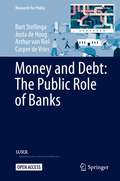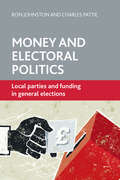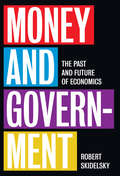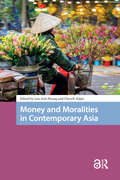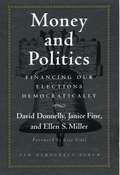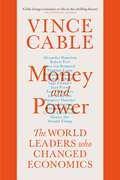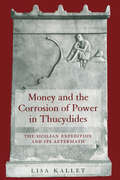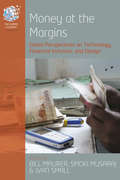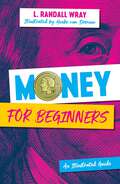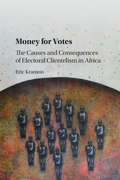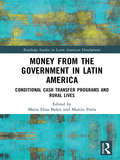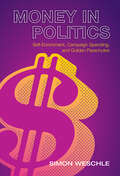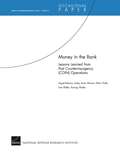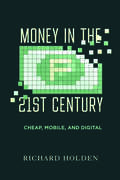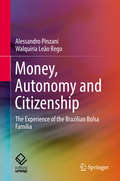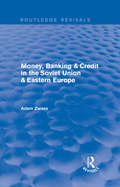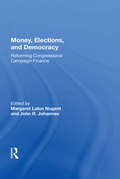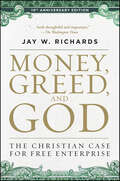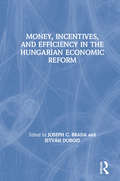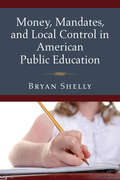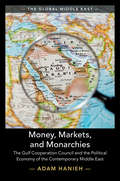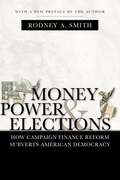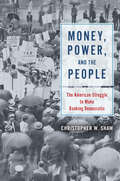- Table View
- List View
Money and Debt: The Public Role of Banks (Research for Policy)
by Arthur van Riel Bart Stellinga Josta de Hoog Casper de VriesThis Open Access book from the Netherlands Scientific Council for Government Policy explains how money creation and banking works, describes the main problems of the current monetary and financial system and discusses several reform options. This book systematically evaluates proposals for fundamental monetary reform, including ideas to separate money and credit by breaking up banks, introducing a central bank digital currency, and introducing public payment banks. By drawing on these plans, the authors suggest several concrete reforms to the current banking system with the aim to ensure that the monetary system remains stable, contributes to the Dutch economy, fairly distributes benefits, costs and risks, and enjoys public legitimacy. This systematic approach, and the accessible way in which the book is written, allows specialized and non-specialised readers to understand the intricacies of money, banking, monetary reform and financial innovation, far beyond the Dutch context.
Money and Electoral Politics: Local Parties and Funding at General Elections
by Ron Johnston Charles PattiePolitical parties are crucial to British democracy, providing the foundations for mobilising voters. Their constituency branches are key links between voters and Parliamentary candidates and their activities require two vital resources – people and money. Much has been written on the decline of party membership but far less on money. In this much-needed new book, Ron Johnston and Charles Pattie use the latest research and hitherto unpublished material to explore financial differences across the UK’s three main parties in the four years leading up to the 2010 General Election. They look at how much local parties raise for election campaigns and find that the more money candidates spend then, the better their performance. Analyses of their annual accounts, however, show that many local parties are unable to raise all of the money that they are entitled to spend on such campaigns. This reveals an unhealthy picture of grassroots party organisation in which the capacity to engage effectively with many voters is concentrated in a relatively small number of constituencies and is likely to remain so. This timely and essential book will make a major contribution to the literature on British elections and parties, especially to continuing debates regarding party funding. It will make important reading for academics, students, politicians, civil servants and others interested in this topic.
Money and Government: The Past and Future of Economics
by Robert SkidelskyA critical examination of economics' past and future, and how it needs to change, by one of the most eminent political economists of our time The dominant view in economics is that money and government should play only minor roles in economic life. Economic outcomes, it is claimed, are best left to the "invisible hand" of the market. Yet these claims remain staunchly unsettled. The view taken in this important new book is that the omnipresence of uncertainty makes money and government essential features of any market economy. Since Adam Smith, classical economics has espoused non-intervention in markets. The Great Depression brought Keynesian economics to the fore; but stagflation in the 1970s brought a return to small-state orthodoxy. The 2008 global financial crash should have brought a reevaluation of that stance; instead the response has been punishing austerity and anemic recovery. This book aims to reintroduce Keynes’s central insights to a new generation of economists, and embolden them to return money and government to the starring roles in the economic drama that they deserve.
Money and Moralities in Contemporary Asia (Transforming Asia)
by Lan Anh Hoang Cheryll AlipioMoney and Moralities in Contemporary Asia provides original, nuanced insights into social meanings of money and wealth in moral economies of Asia. Through case studies from South and Southeast Asia, the collection sheds important light on how the new mobilities and wealth created by neoliberal globalization transform people's ways of life, notions of personhood, and their meaning making of the world. It highlights the moral dilemmas and anxieties emerging from the profound socio-economic transformations that are taking place across the region and deepens our understanding of local cultures as well as the inner contradictions of global capital in Asian contexts. With rich ethnographic insights and a diverse range of empirical contexts, chapters in this volume reveal multifaceted complexities and contradictions in the relationship between money and moralities. Money, they affirm, is not an impersonal, objective economic instrument with homogenizing powers but a culturally constructed and socially mediated currency in which meanings are constantly contested and re-negotiated across time and space.
Money and Politics: Financing Our Elections Democratically
by David Donnelly Janice Fine Ellen S. MillerWhy we need true reform and how it can finally be achieved. "American politics has become an arms race, with money doing the work of missiles. One side escalates and the other follows suit. As the spiral grows it is undermining the soul of democracy. But here's the good news: the majority of Americans want a new system of campaign finance. Every time voters have had a chance to choose a different way, they have spoken loud and clear. Clean money initiatives are proving the citizens' response to the corruption that has turned our elections into auctions. This book is the blueprint to returning democracy to politics." --Bill Moyers As we approach our next presidential election, few issues loom larger than campaign finance reform. While the Senate has agreed to vote on a sweeping bill for reform at the federal level, state voters have passed, or are about to vote on, ballots that limit the amount of private money flooding into campaign war chests. Money and Politics argues that only the full public funding of elections, as enacted with the adoption in Maine of the Clean Elections Act, can solve our campaign financing crisis. Their evaluation of its pros and cons is particularly timely as parts of the Maine option are being considered in competing congressional reform bills. Many of the contributors to this volume have worked closely on campaign finance reform, including Senator Russell Feingold, coauthor of the landmark McCain-Feingold Act. Persuasive, accessible, and controversial, this book makes an important contribution to our debate about the most democratic way to elect the politicians who represent us. NEW DEMOCRACY FORUM is a series of short paperback original books exploring creative solutions to our most urgent national concerns. The series editors (for Boston Review), Joshua Cohen and Joel Rogers, aim to foster politically engaged, intellectually honest, and morally serious debate.
Money and Power: The World Leaders Who Changed Economics
by Vince CableThrough economics, our politicians have the power to transform people's lives for better or worse. Think Deng Xiaoping who lifted millions out of poverty by opening up China; Franklin D Roosevelt whose 'New Deal' helped the USA break free of the Great Depression. Or Peron and his successors in Argentina who brought the country to the brink of ruin.In this magisterial history, economist and politician Vince Cable examines the legacy of 16 world leaders who transformed their countries' economic fortunes and who also challenged economic convention. From Thatcher to Trump, from Lenin to Bismarck, Money and Power provides a whole new perspective on the science of government. Examining the fascinating interplay of economics and politics, this is a compelling journey through some of the most significant people and events of the last 300 years.
Money and the Corrosion of Power in Thucydides: The Sicilian Expedition and Its Aftermath
by Lisa KalletWealth and power are themes that preoccupy much of Greek literature from Homer on, and this book unravels the significance of these subjects in one of the most famous pieces of narrative writing from classical antiquity. Lisa Kallet brilliantly reshapes our literary and historical understanding of Thucydides' account of the disastrous Sicilian expedition of 415–413 b.c., a pivotal event in the Peloponnesian War. She shows that the second half of Thucydides' History contains a damning critique of Athens and its leaders for becoming corrupted by money and for failing to appropriately use their financial strength on military power. Focusing especially on the narrative techniques Thucydides used to build his argument, Kallet gives a close examination of the subjects of wealth and power in this account of naval war and its aftermath and locates Thucydides' writings on these themes within a broad intellectual context. Among other topics, Kallet discusses Thucydides' use of metaphor, his numerous intertextual references to Herodotus and Homer, and thematic links he makes among the topics of money, emotion, and sight. Overall, she shows that the subject of money constitutes a continuous thematic thread in books six through eight of the History. In addition, this book takes a fresh look at familiar epigraphic evidence. Kallet's ability to combine sophisticated literary analysis with a firm grasp of Attic inscriptions sheds new light on an important work of antiquity and provides a model example of how to unravel a dense historical text to reveal its underlying literary principles of construction.
Money at the Margins: Global Perspectives on Technology, Financial Inclusion, and Design (The Human Economy #6)
by Bill Maurer Smoki Musaraj Ivan SmallMobile money, e-commerce, cash cards, retail credit cards, and more—as new monetary technologies become increasingly available, the global South has cautiously embraced these mediums as a potential solution to the issue of financial inclusion. How, if at all, do new forms of dematerialized money impact people’s everyday financial lives? In what way do technologies interact with financial repertoires and other socio-cultural institutions? How do these technologies of financial inclusion shape the global politics and geographies of difference and inequality? These questions are at the heart of Money at the Margins, a groundbreaking exploration of the uses and socio-cultural impact of new forms of money and financial services.
Money for Beginners: An Illustrated Guide
by L. Randall WrayMoney is mysterious. We love it, we hate it, but few people can tell you what the heck it really is. Wouldn’t it be good to get out of the fog? This book will help you understand both the way money works and how to leverage its power. The authors take you on an illuminating journey from your piggy bank to the Federal Reserve with no pesky jargon or complex math. Once you see money clearly, life will never be the same. You’ll know what really goes on in banks and what the cash in your wallet represents. You’ll know how government really spends and why it can’t run out of money. You’ll know what money can actually do — and how we can make it work for us.
Money for Votes: The Causes and Consequences of Electoral Clientelism in Africa
by Eric KramonPoliticians distribute money to voters during campaigns in many low-income democracies. Many observers call this practice 'vote buying'. Money for Votes develops an alternative theory of electoral clientelism that emphasizes the role of monetary handouts in conveying information to voters, helping politicians enhance the credibility of their promises to deliver development resources and particularistic benefits to their constituents. Supported by interviews, experiments, and surveys in Kenya, and additional evidence from qualitative and survey data from elsewhere in Africa, the study tests the implications of this argument, and traces the consequences of electoral clientelism for voter behaviour, ethnic politics, public goods provision, and democratic accountability. Ultimately, the book suggests that the relationship of electoral clientelism to the quality of democracy is far more nuanced than our instincts might suggest.
Money from the Government in Latin America: Conditional Cash Transfer Programs and Rural Lives (Routledge Studies in Latin American Development)
by Martin Fotta Maria Elisa BalenIt has been almost two decades since conditional cash transfer programs first appeared on the agendas of multilateral agencies and politicians. Latin America has often been used as a testing ground for these programs, which consist of transfers of money to subsections of the population upon meeting certain conditions, such as sending their children to school or having them vaccinated. Money from the Government in Latin America takes a comparative view of the effects of this regular transfer of money, which comes with obligations, on rural communities. Drawing on a variety of data, taken from different disciplinary perspectives, these chapters help to build an understanding of the place of conditional cash transfer programsin rural families and households, in individuals’ aspirations and visions, in communities’ relationships to urban areas, and in the overall character of these rural societies. With case studies from Chile, Mexico, Peru, Brazil and Colombia, this book will interest scholars and researchers of Latin American anthropology, sociology, development, economics and politics.
Money in Politics: Self-enrichment, Campaign Spending, And Golden Parachutes
by Simon WeschleIn politics, money is often the name of the game. Politicians enrich themselves while in office, spend campaign money to finance their re-election, and accept lucrative 'golden parachute' jobs after leaving office. Money in Politics argues that these different forms of capital are part of a common system and should be analyzed in a single framework. The book advances a comparative theory that shows how self-enrichment, campaign spending, and golden parachute jobs are connected to each other. This theory explains when and how money enters politics, ultimately illuminating that a change in one form affects the other types and revealing the consequences this has for democracy. The book uses a wide range of evidence from countries around the world, including causally identified quantitative studies, qualitative cross-national comparisons, and original survey experiments. Enlightening and instructive, this book shows that we can only fully comprehend the role of money in politics when we view it as a common system to be analyzed and critiqued.
Money in the Bank: Lessons Learned from Past Counterinsurgency (COIN) Operations
by Peter Chalk Angel Rabasa Ivan Khilko Lesley Anne Warner Paraag ShuklaSix historic counterinsurgency (COIN) operations are examined to determine which tactics, techniques, and procedures led to success and which to failure. The Philippines, Algeria, Vietnam, El Salvador, Jammu and Kashmir, and Colombia were chosen for their varied characteristics relating to geography, historical era, outcome, type of insurgency faced, and level of U.S. involvement. Future U.S. COIN operations can learn from these past lessons.
Money in the Twenty-First Century: Cheap, Mobile, and Digital
by Prof. Richard HoldenAn economist examines three modern forces that have redefined what "money" means, who controls it, and what the future of finance might look like. Money is increasingly cheap, digital, and mobile. In Money in the Twenty-First Century, economist Richard Holden examines the virtues and risks of low interest rates, mobile money, and cryptocurrencies, and explains how these three elemental forces will continue to play out—in our wallets, on the blockchain, and throughout major economies—in the decades to come. Holden weaves in the stories of three people who have exerted massive influence over the future of modern money: US treasury secretary Janet Yellen, Ethereum cofounder Vitalik Buterin, and Raghuram Rajan, former governor of the Reserve Bank of India and chief economist at the International Monetary Fund. Moving from micro to macro, Holden investigates the infrastructure that permits digital transactions, the currencies that underpin them, the race for control of those currencies, shifts in policy and the international monetary system, and the impact on our politics of money in the digital age. Ultimately, Money in the Twenty-First Century asks if governments can keep these three tectonic powers of low interest rates, mobile money, and decentralized finance under control.
Money, Autonomy and Citizenship: The Experience of the Brazilian Bolsa Família
by Alessandro Pinzani Walquiria Leão RegoThis book analyzes the impacts on peoples’ lives of the largest antipoverty social program in the world: the Brazilian Bolsa Família Program. Created by the government of former Brazilian president Luiz Inácio Lula da Silva, Bolsa Família has been for a time the largest conditional cash transfer program in the world, serving more than 50 million Brazilians who had a monthly per capita income of less than USD 50. The program is regarded as one of the key factors behind the significant poverty reduction Brazil experienced during the first decade of the 21st century. Bolsa Família is neither a credit scheme nor a loan. It is a program of civic inclusion: it aims to help citizens meet their most basic needs and sometimes just to survive. Its goal is to create citizenship, not to merely train the entrepreneurial spirit. Having this in mind, the authors of this book spent five years (2006-2011) interviewing more than 150 women registered in the program to see how the cash transfers impacted their everyday lives. The authors concluded that the program produces significant social impacts in the beneficiaries’ lives by increasing their levels of moral, economic and political autonomy, promoting citizenship. Money, Autonomy and Citizenship - The Experience of the Brazilian Bolsa Família will be of interest to both academic researchers and public agents involved with the study, development and implementation of public policies aimed at reducing poverty and promoting social justice.
Money, Banking & Credit in the soviet union & eastern europe (Routledge Revivals)
by Adam ZwassThis title was first published in 1979. Essential information for understanding a credit system that is different from that of the 'Capitalist' countires and which has envolved into an integral and essential part of 'soviet- type economies'. Dr Zwass has done a workman-like job in providing another valuable contribution to our knowledge of economies of eastern europe- George Garvy.
Money, Elections, And Democracy: Reforming Congressional Campaign Finance
by Margaret Latus Nugent John R. JohannesThis book is concerned with how the system of congressional campaign financing and proposals for its reform affect key values. It focuses on specific problems with the sources of campaign funds, undesirable consequences of the campaign finance system, and difficulties with reforming the system.
Money, Greed, and God
by Jay W. RichardsDoes capitalism promote greed? Can a person follow Jesus's call to love others and also support capitalism? Was our recent economic crisis caused by flaws inherent to our free market system? Jay Richards presents a new approach to capitalism, revealing how it's fully consistent with Jesus's teachings and the Christian tradition, while also showing why this system is our best bet for renewed economic vigor. The church is bombarded with two competing messages about money and capitalism: wealth is bad and causes much of the world's suffering wealth is good and God wants you to prosper and be rich Richards exposes these myths, and other common misconceptions about capitalism, and reveals the surprising ways that capitalism is, in fact, the best system to respond to the biblical mandates of alleviating poverty and protecting the environment. Money, Greed, and God equips readers to take practical steps in their own lives to conduct business, worship God, and serve others without falling into the "prosperity gospel" trap.
Money, Greed, and God: The Christian Case for Free Enterprise
by Jay W. RichardsA prominent scholar reveals the surprising ways that capitalism is actually the best way to follow Jesus’s mandates to alleviate poverty and protect our earth.Christianity generally sees capitalism as either bad because it causes much of the world’s suffering, or good because God wants you to prosper and be rich. But there is a large, growing audience of evangelical and mainline Christians who are deeply uneasy about how to follow Jesus’s mandate to care for the poor and the environment while living with the excesses of capitalism.Now, a noted Christian scholar argues that there is a middle view that reveals Christianity cannot only accommodate capitalism, but Christian theology can help explain why capitalism works. By highlighting the most common myths committed by Christians when thinking about economics, such as “capitalism is based on greed and over consumption” or “if someone becomes rich that automatically means someone else will become poor,” Money, Guilt, and God equips readers to take practical steps in their own lives to conduct business, worship God, and serve others without falling into the “prosperity gospel” trap.
Money, Incentives and Efficiency in the Hungarian Economic Reform
by Joseph C. Brada Istvan DoboziThe essays in this volume document the serious shortcomings of the Hungarian economic reform, which in two decades has brought deteriorating economic performance, declining real wages, a fiscal deficit and severe inflationary pressures. It has proved unexpectedly difficult to substitute a regulated market economy for a centrally planned one. The authors of these essays argue that the problems stem from the incompleteness of the reforms and their compromise character. Today, as the Hungarians prepare to implement more radical measures, constraining the Communist party and rolling back state ownership, they do so under economically difficult conditions.
Money, Mandates, and Local Control in American Public Education
by Bryan ShellyPointing to the disparities between wealthy and impoverished school districts in areas where revenue depends primarily upon local taxes, reformers repeatedly call for the centralization of school funding. Their proposals meet resistance from citizens, elected officials, and school administrators who fear the loss of local autonomy. Bryan Shelly finds, however, that local autonomy has already been compromised by federal and state governments, which exercise a tremendous amount of control over public education despite their small contribution to a school system's funding. This disproportionate relationship between funding and control allows state and federal officials to pass education policy yet excuses them from supplying adequate funding for new programs. The resulting unfunded and underfunded mandates and regulations, Shelly insists, are the true cause of the loss of community control over public education. Shelly outlines the effects of the most infamous of underfunded federal mandates, the No Child Left Behind Act of 2001 (NCLB), and explores why schools implemented it despite its unpopularity and out-of-pocket costs. Shelly's findings hold significant implications for school finance reform, NCLB, and the future of intergovernmental relations.
Money, Markets, and Monarchies: The Gulf Cooperation Council and the Political Economy of the Contemporary Middle East (The Global Middle East #4)
by Adam HaniehFramed by a critical analysis of global capitalism, this book examines how the six states of the Gulf Cooperation Council are powerfully shaping the political economy of the wider Middle East. Through unprecedented and fine-grained empirical research - encompassing sectors such as agribusiness, real estate, finance, retail, telecommunications, and urban utilities - Adam Hanieh lays out the pivotal role of the Gulf in the affairs of other Arab states. This vital but little recognised feature of the Middle East's political economy is essential to understanding contemporary regional dynamics, not least of which is the emergence of significant internal tensions within the Gulf itself. Bringing fresh insights and a novel interdisciplinary approach to debates across political economy, critical geography, and Middle East studies, this book fills an important gap in how we understand the region and its place in the global order.
Money, Power, and Elections: How Campaign Finance Reform Subverts American Democracy (Media & Public Affairs)
by Rodney A. SmithHave campaign finance reform laws actually worked? Is money less influential in electing candidates today than it was thirty years ago when legislation was first enacted? Absolutely not, argues Rodney A. Smith in this passionately written, fact-filled, and provocative book. According to Smith, the laws have had exactly the opposite of their intended effect. They have increased the likelihood that incumbents in the House and Senate will be reelected, and they have greatly diminished the chances that candidates who are not wealthy will be elected. Smith's claims are supported by convincing data; he collected and analyzed information about all federal elections since 1920. These data show clearly that money matters now more than ever. Smith thinks that reform legislation has created a new inequality for candidates that, if left unchecked, threatens to destroy the American electoral process by obliterating the foundational principle of free speech. He argues that "money buys speech" and when candidates lack money to buy media time and space they are effectively silenced. Their inability to "speak freely" violates the most significant intentions of our nation's founders: that a sovereign citizenry elect its own leaders based on a free exchange of ideas. For Smith, campaign finance reform has unwittingly unbalanced the checks and balances created by the Framers of the Constitution.After presenting a detailed historical overview of how we have reached the present crisis, Smith proposes a simple solution: institute a process that completely discloses relevant information about campaign donors and recipients of donations. All disclosures would be available to the media, which would be able to investigate and report them fully. Only then, Smith believes, will the United States have the opportunity to be the democratic republic that its founders intended.
Money, Power, and the People: The American Struggle to Make Banking Democratic
by Christopher W. ShawBanks and bankers are hardly the most beloved institutions and people in this country. With its corruptive influence on politics and stranglehold on the American economy, Wall Street is held in high regard by few outside the financial sector. But the pitchforks raised against this behemoth are largely rhetorical: we rarely see riots in the streets or public demands for an equitable and democratic banking system that result in serious national changes. Yet the situation was vastly different a century ago, as Christopher W. Shaw shows. This book upends the conventional thinking that financial policy in the early twentieth century was set primarily by the needs and demands of bankers. Shaw shows that banking and politics were directly shaped by the literal and symbolic investments of the grassroots. This engagement remade financial institutions and the national economy, through populist pressure and the establishment of federal regulatory programs and agencies like the Farm Credit System and the Federal Deposit Insurance Corporation. Shaw reveals the surprising groundswell behind seemingly arcane legislation, as well as the power of the people to demand serious political repercussions for the banks that caused the Great Depression. One result of this sustained interest and pressure was legislation and regulation that brought on a long period of relative financial stability, with a reduced frequency of economic booms and busts. Ironically, this stability led to the decline of the very banking politics that brought it about. Giving voice to a broad swath of American figures, including workers, farmers, politicians, and bankers alike, Money, Power, and the People recasts our understanding of what might be possible in balancing the needs of the people with those of their financial institutions.
Money, Sex, War, Karma
by David R. LoyWhat's Wrong with Sex? How to Drive Your Karma Consciousness Commodified The Karma of Food The Three Poisons, Institutionalized Why We Love War These are just some of the chapters in this brilliant book from David R. Loy. In little time, Loy has become one of the most powerful advocates of the Buddhist worldview, explaining like no one else its ability to transform the sociopolitical landscape of the modern world. In this, his most accessible work to date, he offers sharp and even shockingly clear presentations of oft-misunderstood Buddhist staples-the working of karma, the nature of self, the causes of trouble on both the individual and societal levels-and the real reasons behind our collective sense of "never enough," whether it's time, money, sex, security... even war. Loy's "Buddhist Revolution" is nothing less than a radical change in the ways we can approach our lives, our planet, the collective delusions that pervade our language, culture, and even our spirituality.
